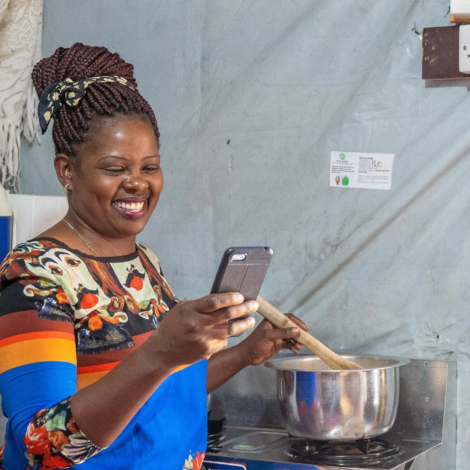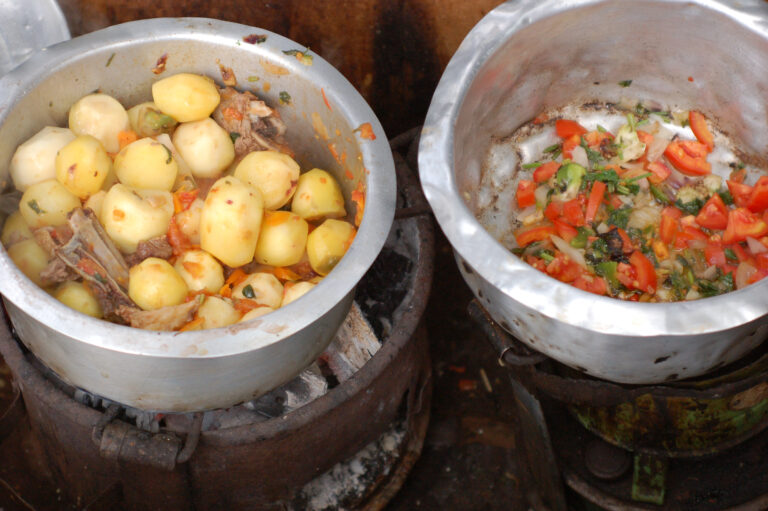Sun King’s recent acquisition of PayGo Energy represents a decisive advancement in clean cooking technology for off-grid and underserved communities. Sun King is the largest off-grid solar products company in Africa and Asia, with mature distribution networks and supply chains. PayGo, meanwhile, has pioneered pay-as-you-go technology and services for liquefied petroleum gas. The newly combined duo have promised to merge their strengths and speed the transition to clean cooking technologies in kitchens that now cook with charcoal, wood and kerosene.
PayGo beat long odds to arrive at the moment when their team walked through the doors with moving boxes in hand at Sun King’s regional headquarters in Nairobi. The startup had raised Series A funding before its acquisition, placing it in a vanishingly small minority worldwide. Less than 10 percent of companies that raise a seed round, as PayGo did, successfully raise Series A investment. Those that do make it to Series A, the first round of venture capital investment, have demonstrated that they have more than just a great idea, they have a Minimum Viable Product. Once a company has passed that milestone, it has about a 50 percent chance of being acquired. And those statistics are for the all-inclusive field of startups in general. PayGo, a startup in a region and a category of technology that are notoriously light on investment, achieved Series A and then acquisition.
A lift from a startup accelerator
One factor in PayGo’s success was its performance in the startup accelerator ASME ISHOW – the American Society of Mechanical Engineers Innovation Showcase. ISHOW supports early-stage social entrepreneurs developing tangible technology (not solely software) that improves lives in the world’s underserved communities. PayGo fit the description and won the U.S. regional ISHOW in 2016. ISHOW’s rewards package included money for product development, as well as engineering and design consultation.
Video: See PayGo’s winning ISHOW pitch
The fundraising mentorship that ISHOW provided helped PayGo tell a story that resonated with investors, Nick Quintong, PayGo’s Co-Founder and now former CEO, told E4C.
“ASME’s ISHOW brought in expert mentors from Catapult Design who had deep domain expertise in designing products for emerging markets,” Mr. Quintong says. “Catapult’s design team provided critical guidance and support on PayGo Energy’s first product and service, and many of the outputs from their work are still key components of our technology today. The mentorship that ISHOW also provided around fundraising played an important role in helping us tell a story that resonated with investors and ultimately helped PayGo Energy secure our first round of funding.”
ASME and Catapult helped PayGo improve the user experience of their meter prototypes. With expert guidance, PayGo generated lists of questions they had yet to answer. The questions revealed gaps in their knowledge of how customers use their product and what they would want in the finished version. For example, what information should appear in the meter display and what information should arrive by text? And should there be a power button to turn on the stove?
To find answers, the ISHOW expert team went to the source. They spent a week in Mukuru with PayGo’s team, building and testing prototypes and speaking with community members with help from an interpreter, according to Demand | ASME’s Global Development Review.
“Our job was to help them answer some of those questions,” Heather Fleming, ISHOW expert and then Catapult’s CEO (now Co-Founder and Director of Change Labs), says. “We relied a lot on the prototypes that [PayGo] had already built to communicate some of these concepts with their prospective customers. Households that they’d been consulting with who were helping to inform them on what the product and service might be.”
Something new in clean cooking
PayGo Energy recruited its first cooking gas customers in 2016 in Mukuru, a large informal settlement in Nairobi, Kenya. The startup was testing prototypes among Mukuru’s 750,000 people while seeking seed funding. PayGo later went on to attract Series A investment before its acquisition by Sun King. But in its earliest days, PayGo ignored convention and stumbled upon a creative marketing technique as it fought to introduce an unknown technology in some of the world’s most impoverished communities.
Working in Mukuru, Fausto Marcigot, PayGo’s engineering lead, connected a gas burner in each customer’s home to a metered canister of liquefied petroleum gas (LPG), or propane. The standard fuels in Mukuru and Nairobi’s other informal settlements are charcoal and other kinds of biomass, and kerosene. There is no infrastructure for delivering gas directly into kitchens. After installing a gas burner and a PayGo LPG canister, Mr. Marcigot would boil a kettle of water. Unwilling to let a hot kettle go to waste, the residents would invite friends and family for a tea party. Thus, the Kenyan version of a U.S. Tupperware party was born in Mukuru’s kitchens.
A startup built on a meter and a service
The meters are PayGo’s technological innovation and one of the pillars upon which the startup was built. With the meter, a standard canister of LPG can release only the quantity of gas that a user has bought.
The original meter includes a GSM communications unit, a gas measurement system and shut-off valve. The three components are bundled into a pre-certified and explosion-proof casing, important for an electrical device mounted on a gas canister.
The meter attaches to a standard gas canister with a tamper-proof lock. The gas, in turn, connects to a burner that PayGo buys from a third-party manufacturer and packages together with the gas.
Customers pay with their phones. PayGo’s meter is integrated with M-Pesa, a nearly ubiquitous mobile money platform in Kenya. PayGo remotely monitors its meters, calculates the gas that remains in each canister and plans deliveries to maintain an uninterrupted supply of gas in each home.
“Using M-Pesa, you can purchase small top-ups directly to the meter. As you cook, the gas meter goes down, and went it reaches zero we have a small valve that closes until you top up again. We also monitor how much gas is in the cylinder. Before you run out, you’ll get a call from an agent to organize another refill,” Mr. Marcigot told the ASME Foundation. He and the PayGo team explain further in the video below.
PayGo’s Safer, Affordable Way to Cook Indoors
“This is the community where I grew up and so going back to them, to their homes, is very emotional sometimes because I get to see [they] can be able to purchase gas and cook with the little amount that they have on their phones,” Mr. Sylvester Oloo, Operations Lead, told the ASME Foundation.
PayGo’s approach allows households to pay for gas a little at a time rather than for an entire canister. Buying and refilling whole canisters is out of reach and too expensive for the households that PayGo’s technology serves.
“Here in Kenya, a lot of the population lives on a day-to-day basis. They often get paid on a daily or weekly basis, and so they can’t really afford a full cylinder of gas, ” Mr. Marcigot told Demand. “What they can afford is a small daily payment.”
If the meter is one pillar upon which PayGo was built, the delivery service is the second pillar.
When PayGo launched, a surge of energy startups peddled solar power through pay-as-you-go business models, and the trend influenced PayGo’s business model. The differences between gas and solar, however, presented at least one complication.
“It’s no good providing one tank of gas with a pay-as-you-go meter if you can’t then supply gas on a continuous basis,” Mr. Marcigot says . “That’s a challenge that the solar companies don’t face, because once you [hook] up your panel, as long as the sun is shining, you can continue to provide the utility.”
Mr. Marcigot’s comparison to solar companies proved prescient. Seven years after making that comment,, PayGo joined Sun King.
Why gas?
Transitioning to clean cooking through modern stoves and fuels provides at least four benefits. First, it’s cheaper. Customers who switch from charcoal to PayGo’s gas service have saved 25-30 percent on their daily fuel costs. Traditional cooking methods also incur high costs, with many African households spending about a quarter of their income on wood and charcoal—more than they spend on power and light.
The other benefits are less immediate, but no less important. Clean cooking reduces carbon emissions, decreases deforestation, and clears up indoor air which by extension improves public health.
Nearly three billion people globally rely on open wood fires and charcoal stoves for cooking. Their cooking fuels contribute significantly to global warming, accounting for roughly two percent of global carbon emissions. In their announcement of the union with PayGo, Sun King points out that two percent is roughly equal to the carbon footprint of the entire global air travel industry.
One important aspect of the benefits of clean fuels is that they extend largely to women. Cleaner technology improves outcomes among an underserved demographic living within the larger underserved communities. Women are particularly prone to respiratory disease linked to their exposure to smoke and emissions in the kitchen. Moreover, collecting wood and tending to fires disproportionately burden women.
Sun King’s foray into clean cooking
When Sun King bought PayGo, the company hired Mr. Quintong to head its clean cooking team. That team comprises mostly former PayGo employees. PayGo’s whole crew of 40 people in Nairobi moved less than a mile down the road to Sun King’s office. Sun King expanded its facility to include a lab and workspace for the new Clean Cooking Team. Mr. Quintong calls the arrangement a close collaboration that should spur innovation in clean cooking technology.
New products are already in the market trial phase.
“Currently, Sun King’s Clean Cooking Team is trialing a variety of pay-as-you-go cooking appliances in different locations in Kenya,” Mr. Quintong told E4C. “Following the conclusion of these trials, the team will evaluate the best strategies for introducing these innovative products to new markets across Africa and Asia. Given the pressing need for clean cooking solutions, we anticipate significant demand for these offerings.”
Sun King Clean Cooking has promised technology agnosticism. The clean cooking division will develop a range of products and services to help households shift to cleaner, more environmentally friendly alternatives. One alternative in their sites is pay-as-you-go electric stoves. Sun King’s preliminary findings suggest that electric pressure cookers could reduce costs by more than 75 percent compared to charcoal stoves.
“The team is excited about these appliances’ potential for transforming cooking practices, promoting energy efficiency, and improving overall affordability,” Mr. Quintong says.
Larger than the sum of their parts
PayGo and Sun King each bring their strengths to the table in their new union. The PayGo Energy team is contributing its established products as well as its technical and creative talent. Sun King plans to tap its vast distribution network to scale the uptake of new cooking technologies in the world’s underserved communities. As Sun King said in its announcement of the deal, the larger company will apply its expertise in finance, technology, and distribution to solve challenges in cooking technology.
Sun King plans to develop a range of cooking products powered by LPG, solar energy, the electrical grid and other energy sources, the company said in a statement. The products will be paired with consumer financing services that allow African and Asian customers to pay for energy and equipment in small, affordable instalments.
“PayGo Energy’s deep knowledge of clean cooking and the economic, environmental, social, and cultural issue sets that drive unsustainable cooking was the foundation for the acquisition,” Mr. Quintong says. “A significant advantage of the acquisition is that it allows Sun King to tap into its robust distribution infrastructure to sell clean cooking appliances alongside its range of solar products.”

